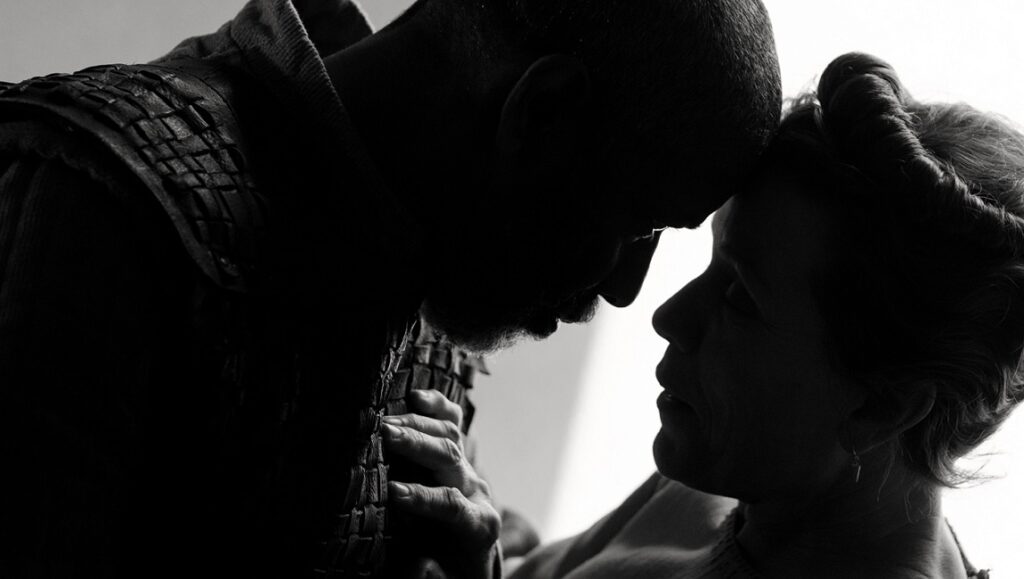The Tragedy of Macbeth is masterful in its fusing of the artificial and elemental, a bit of Shakespearean subterfuge that justifies this umpteenth take on the eponymous play.
The Coens excel in films that flaunt a superficial mastery of genre, form, and cinematic grammar, all to arrive at intentionally depleted and exhausted conclusions. Projects either end up in absolute infernos (Barton Fink), or coil themselves so tightly they shatter into giddy cynicism (Burn After Reading), their total command allowing for extreme capriciousness. Joel’s first solo outing is the ultimate act of adaptive mimicry: owing to the sheer amount of interpolation, transposition, and interpretation involved in adapting Shakespeare, Macbeth, the chosen (cursed) source material, still leaves considerable room for authorial ambition.
The Tragedy of Macbeth’s predecessors uniformly exist in their respective aesthetic-thematic vacuums, which occasionally foreground a discombobulating detachment that is somehow overly studious but emotionally underbaked; their approaches fail to furnish the precarious schemes their characters are saddled with. But considering how much mileage a director can derive from Macbeth, the Coens’ preferred method of creative tunnel vision is a welcome diversion from the Bard’s works being bastardized, contemporized, or both. Fiercely aware of various cross-medium considerations, Joel Coen presides over a give-and-take relationship between theater and film. Shot on just one Los Angeles soundstage, The Tragedy of Macbeth replicates set-changes with methods achievable only through the manipulation of the camera, such as an impossibly struck angle craning into a “different” location (a burning letter is sent up into the night sky, and the same star patterns then shine down on Brendan Gleeson’s Duncan), or a subtle deployment of otherwise jovial silhouettes to highlight Macbeth’s (Denzel Washington) lonely hesitation ahead of his fatal first step towards kinghood.
These are polite liberties, which may not even initially scan as such, considering the film’s fidelity to the text. But then, even the varying accents — the dialects Washington and Frances McDormand, as Lady Macbeth, are not consistent with Scotland, or with costars such as Gleeson — are yet another facet of Coen’s inquisitive temperament, as if he were investigating how far Shakespeare’s writing could stretch while still set within the immediate world on the page. The visual design often trades in austerity for expressionistic flourishes, and vice versa (the use of black and white and Academy ratio framing handily complements such multitasking), which places The Tragedy of Macbeth somewhere between Orson Welles, Akira Kurosawa, and even Michael Almereyda — though the Coens’ signature bloodlust, lightly daubed on the canvas, has a welcome sting, even at its most unpleasant.
Given the built-in artifice, The Tragedy of Macbeth is still surprisingly elemental; in yet another rewiring of what’s become Macbeth norm — portraying Scotland as a fetid, muddy landscape of isolation — Coen shapes the soundstage into an arid steppe of alternating desert and forest, where the weird sisters (singularly embodied by Kathryn Hunter, who approaches the role with a polyvocal ingenuity) writhe in the sand, and even the scantest of raindrops ring out thunderously upon stone surfaces (the sound design juxtaposes attendant noises with unconventional sources). Scotland looks as if it’s prematurely decayed, which matches Washington’s fatigued visage and gray hair: Macbeth’s monomania may be archetypally youthful, but its bearer is not. The Tragedy of Macbeth is an old-man film, its reinterpretation of juvenile folly shot through with a visceral fear of aging and bodily disintegration. As Macbeth is such a universally recognizable work, it requires a universally recognized director and ensemble to follow through on such worthwhile subterfuge.
Originally published as part of New York Film Festival 2021 — Dispatch 2.


Comments are closed.